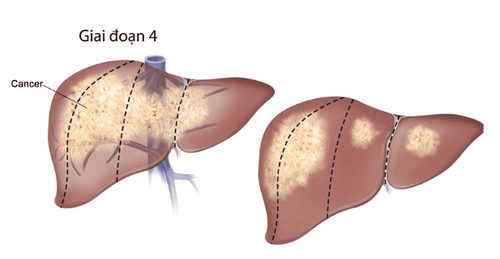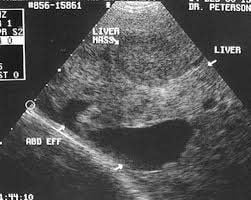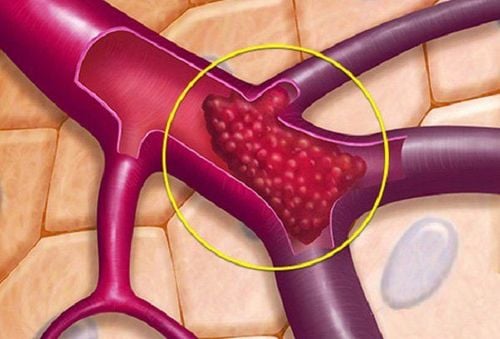This is an automatically translated article.
Metastatic liver cancer is a condition in which mutated cells in the liver have grown and spread to other organs in the body. At this stage, the treatment is quite difficult and the patient's survival time is relatively short.
1. How does liver cancer metastasize?
The overgrowth of liver cancer cells can invade nearby tissues. By traveling through lymphatic vessels and blood vessels, cancer cells will invade many other tissues or organs in the body, causing secondary cancers in the bones, brain, lungs, etc. Liver cancer that invades nearby tissues or organs is called locally disseminated, and usually occurs at stage 3C or 4A.
In stage 3C, the malignant tumor in the liver has grown into the outermost layer of the liver. At stage 4A, in the liver appears one or more tumors of various sizes. Some tumors have grown to reach blood vessels or organs near the liver, and cancer cells are also present in nearby lymph nodes. By stage 4B, malignant tumor can reach any size, cancer cells have metastasized to other organs in the body, usually bones, lungs, colon,...
Note : It is necessary to clearly distinguish metastatic liver cancer and secondary liver cancer. Metastatic liver cancer is a malignant tumor that begins in the liver and spreads to other organs in the body. Secondary liver cancer is a phenomenon where cancer cells from other organs such as colon, rectum, stomach, pancreas, esophagus, breast, lung,... metastasize to the liver and form malignant tumors. here. Is secondary liver cancer curable? Basically, secondary liver cancer cannot be cured because this is the final stage of cancer, liver function is strongly destroyed. Treatment is only aimed at reducing pain, prolonging life, and improving the patient's quality of life.

Ở giai đoạn 4 ung thư gan có dấu hiệu di căn tới các cơ quan khác trên cơ thể
2. Symptoms of metastatic liver cancer
When new malignant cells appear in the liver, the person may not have any symptoms. However, when cancer metastasizes, there will be many complicated symptoms. Where liver cancer metastasizes, it will cause typical symptoms in those organs, in addition to manifestations at the starting site, which is the liver. Common symptoms in patients with metastatic liver cancer are:
2.1. Symptoms in the liver and body: There is a tumor on the right side of the abdomen. Abdominal pain, bloating, loss of appetite, nausea. Fatigue, weakness, rapid and rapid weight loss. Fever, dark urine, and markedly yellow skin and eyes. 2.2. Symptoms in other organs Liver cancer with lung metastasis: chest pain, shortness of breath, prolonged cough, pleural effusion,... Liver cancer metastasized to bone: bone pain, fracture. Liver cancer metastasis to the brain: headache, dizziness, fatigue, visual impairment,...

Bệnh nhân ung thư gan di căn có biểu hiện vàng da, vàng mắt
3. Diagnosis of metastatic liver cancer
After the clinical examination, the patient may be subjected to a series of tests so that the doctor can make the most accurate conclusion. Specifically:
Blood tests, eg alpha-fetoprotein (AFP) test to screen for liver problems. The amount of alpha-fetoprotein in the blood is often increased in patients with liver cancer. In addition, testing alpha-fetoprotein levels also helps doctors determine appropriate treatment and monitor whether the cancer has returned. Imaging tests: Ultrasound, MRI,... support to locate the tumor. If a tumor is found, a biopsy may be done to help the doctor determine if it is cancer.
4. Treatment of metastatic liver cancer
End stage metastatic liver cancer often has no definitive treatment. Current treatments can slow down metastasis and alleviate patient discomfort. Depending on the specific case of the number of tumors, the location of the cancer spreading, the doctor will recommend an appropriate treatment method for the patient. Some of the factors that influence the main treatment are prior therapy, liver condition, and general health of the patient.
Some common treatments for metastatic liver cancer are:
Chemotherapy: applied to destroy cancer cells throughout the body. Radiation therapy: treatment in areas where malignancy occurs. Take pain relievers, fatigue and other symptoms.
5. How long does metastatic liver cancer live?
Entering the metastatic stage, the patient's survival time is not long. According to many statistics, 7% of people with metastatic liver cancer are detected and treated early can prolong life by 5 years. With stage 4 liver cancer, only 2% of patients can live another 5 years. Some factors that directly affect the survival rate of patients are liver condition, general health,... Specifically, if liver cancer patients have cirrhosis, the survival rate will decrease. Go.
6. Prevention of metastatic liver cancer

Tiêm vắc xin để ngừa virus viêm gan B
The most basic way to prevent metastatic liver cancer is to prevent the risk of liver cancer. Some commonly used measures are:
Vaccinate against hepatitis B virus. Periodic health check-up to check for liver problems and close monitoring, appropriate treatment according to the doctor's advice doctor. Health check-ups should let your doctor know if you have a family history of liver cancer or other risk factors for liver cancer. Eat right and exercise regularly to stay in shape. Limit the use of alcoholic beverages. If you have alcoholic cirrhosis, you should ask your doctor about alcohol withdrawal methods.
Early diagnosis plays a decisive role in the effectiveness of liver cancer treatment. Therefore, patients need to periodically check and screen for liver cancer. Currently, Vinmec International General Hospital is currently providing a package of screening and early detection of liver cancer to help screen for liver cancer, detect liver cancer early to have an appropriate and effective treatment plan. for patients. Customers with high risk of liver cancer such as: family history of liver cancer, viral or alcoholic cirrhosis, hepatitis B, chronic hepatitis C, alcoholism or regular alcohol consumption,. .. should go for regular liver cancer screening.
When registering for the Liver Cancer Screening and Early Detection Package, the patient will be directly examined by a specialist doctor, will be given tests to assess liver function, screen for hepatitis B, hepatitis C and hepatitis C. diagnostic imaging for malignant tumors. With a system of modern machinery and a team of highly qualified and experienced doctors, Vinmec is committed to the best protection for the health of patients.
Please dial HOTLINE for more information or register for an appointment HERE. Download MyVinmec app to make appointments faster and to manage your bookings easily.













